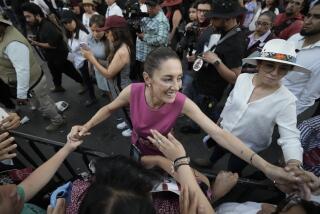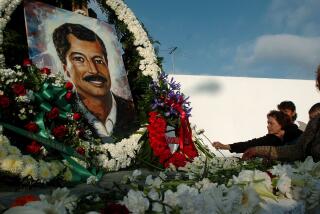Enrique Peña Nieto wins Mexico’s presidency, early results show
MEXICO CITY — Millions of Mexicans voted Sunday to restore to power a once-authoritarian party they dumped 12 years ago, according to preliminary results, while also delivering a harsh rebuke to a government that advanced democratic rule but saw the country plunge into grisly violence.
In an initial, partial count released just before midnight, the federal election commission said Enrique Peña Nieto, the telegenic candidate for the Institutional Revolutionary Party, or PRI, was winning about 38% of the vote. He was leading his nearest competitor, leftist Andres Manuel Lopez Obrador, by about 6 percentage points.
The election commission figures are meant to be a representative sample of the nationwide vote. Shortly after they were released, Peña Nieto appeared on television to claim victory.
“This Sunday, Mexico won,” he said, promising change. He thanked voters and said he would run a presidency that was “responsible and open to criticism.”
Peña Nieto was ahead by an even larger margin, as much as 11 percentage points, in exit surveys conducted by pollsters and Mexican news media. And the current president, Felipe Calderon, welcomed Peña Nieto as his successor. But Lopez Obrador, a former mayor of Mexico City and leader of a coalition of leftist parties, refused to concede.
Lopez Obrador lost the 2006 presidential race to Calderon by less than 1 percentage point, refused to recognize the results and touched off a wave of protests that paralyzed Mexico City for months.
Peña Nieto’s win would return to power the party that ruled virtually unchallenged for seven decades until its defeat in 2000, which ushered in an era of government under the conservative National Action Party, or PAN.
Josefina Vazquez Mota, the candidate for the incumbent party, was by all accounts a distant third. She conceded defeat less than an hour after voting ended.
Sunday’s vote could prove disastrous for the PAN, which came to office with enormous promise but has left many Mexicans disillusioned with their nation’s democratic transition and a raging drug war.
Calderon was barred by law from running for a second term.
Voting was mostly peaceful Sunday, but there were numerous complaints of slow-to-open polling stations, long lines and shortages of ballots. The army announced on the eve of the vote that it was redoubling forces in the border city of Nuevo Laredo after suspected drug traffickers detonated a car bomb outside City Hall on Friday.
Tens of thousands of troops are deployed across Mexico to fight powerful drug cartels who supply users in the United States with much of their cocaine, heroin, marijuana and methamphetamine. That fight, launched by Calderon soon after he took office, has claimed more than 50,000 lives in nearly six years.
Mexicans are dismayed with the violence, which has also touched off waves of kidnapping and extortion, and dissatisfied with sluggish economic growth. They seem willing to return to a party that once represented an undemocratic system of coercion and repression, but claims to have reformed.
At the PRI’s headquarters, a victory party began moments after the first exit poll results were announced. Scores of employees of Mexico’s state-owned oil company, Pemex, decked out in red T-shirts waved flags with the party logo and chanted, “We are going to win! We are going to win!”
Cesar Santiago, wearing a red hard hat adorned with a PRI sticker, said a Peña Nieto win would bring improvements to the country’s lethargic economy and reduce violence. “It was a failure,” Santiago said of the drug war. “It should have been better planned, with a better strategy.”
Santiago said the PRI had changed since last time it ruled, a reign infamous for corruption and, occasionally, strong-arm tactics to maintain its almost complete dominance over Mexican life. “The PRI-istas who are there now are young. They really want Mexico to improve.”
But a few rows away were signs of the old, coercive PRI. Four young women sat gripping rolled-up PRI flags. They said they were required by bosses at Pemex to attend the PRI party. “If we don’t come, we don’t go back to work,” said one of the women, who declined to give her name to avoid being punished by the company. She said she voted for Lopez Obrador.
“It’s like the ‘60s,” she said, referring to coercive PRI tactics of the past. “It hasn’t gone away.”
In Atlacomulco, Peña Nieto’s birthplace outside the capital in the state of Mexico, the mood from early in the day was triumphant. Peña Nieto served as governor of the state, Mexico’s most populous, until last year.
Voters in Atlacomulco, a bastion of PRI sympathy, jostled in hopes of getting a photograph with Peña Nieto, 45.
Comments from Mexicans showing up to cast their ballots went a long way in explaining his support.
“The PAN did not know how to govern,” said Ricardo Avila, 45, a cashier at a convenience store, referring to Calderon’s party. “They had their chance and wasted it. Time for the PRI.”
Disappointment with the lack of democratic reforms during the last 12 years of PAN government, plus the violence, has fed opposition to the ruling party. Voters turned in droves to the PRI. The PRI also spent years carefully building up its support at the local level and does not hesitate to pay voters to vote.
“The PRI knows how to deal with the narco,” said Roberto Salcido, owner of a chain of tortilla shops in Atlacomulco. “When they were in power, the country did not suffer because the deal was, ‘You move your drugs but you don’t mess with me.’ It worked. The country was calm.”
“If [making deals with drug traffickers] is what ends the violence and the extortion, then, yes,” Salcido added. “The PRI knows how to make the drug traffickers respect them.”
Peña Nieto, who has pledged to continue fighting drug cartels, arrived to vote accompanied by his new wife, a soap opera star, and children from a previous marriage. A small group of people who said they were university students appeared to protest his probable victory — which they called a “manipulated vote,” in reference to Peña Nieto’s cozy relationship with Mexico’s main television broadcasters.
Four members of the Gonzalez Romo family arrived the minute polls opened, hoping to catch a glimpse of the candidate.
“He seems honest and is very handsome,” Maria Romo said.
Her husband, Armando Gonzalez, bristled at questions about allegations of corruption that dog the PRI.
“Maybe you can accuse him of being a Don Juan, for his conquest of women — we men are like that,” Gonzalez, 61, said. “But not corrupt.”
Neither Peña Nieto nor the other candidates proposed major changes in the drug war and all insisted on continued use of the military and close cooperation with the United States, which has invested millions of dollars in the battle. Peña Nieto said before the vote that if elected he would appoint Colombian super-cop Gen. Oscar Naranjo, a favorite of Washington, as his special advisor in the fight against organized crime.
Peña Nieto has also pledged to open Pemex up to desperately needed foreign investment, a move that is barred by the Mexican Constitution and which his party steadfastly opposed until recently.
Mexicans on Sunday were also electing governors in six states, and the PAN stood to lose there, as well. The PRI dominance extended to the western state of Jalisco, which had been governed by the PAN since 1995; exit polls showed the PAN candidate in third place.
In the sprawling capital, Mexico City, the left retained the mayorship in a landslide. The Democratic Revolution Party’s Miguel Angel Mancera, former attorney general for the city, was elected to replace popular Mayor Marcelo Ebrard, besting his nearest rival by nearly 40 percentage points.
News assistants Cecilia Sanchez and Daniel Hernandez in The Times’ Mexico City bureau contributed to this report.
More to Read
Start your day right
Sign up for Essential California for news, features and recommendations from the L.A. Times and beyond in your inbox six days a week.
You may occasionally receive promotional content from the Los Angeles Times.







